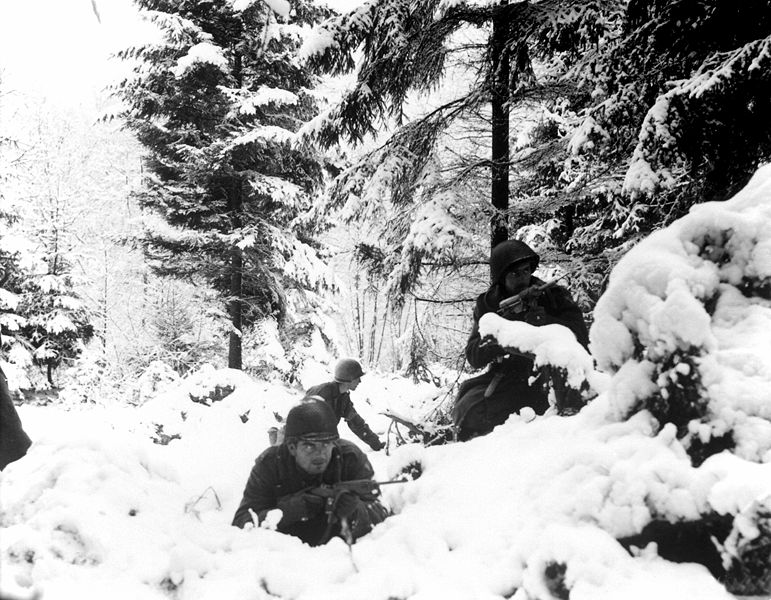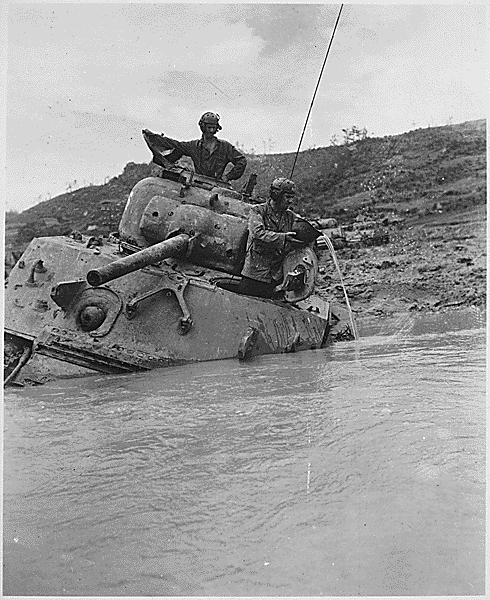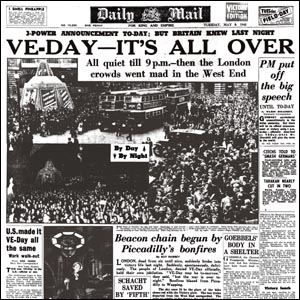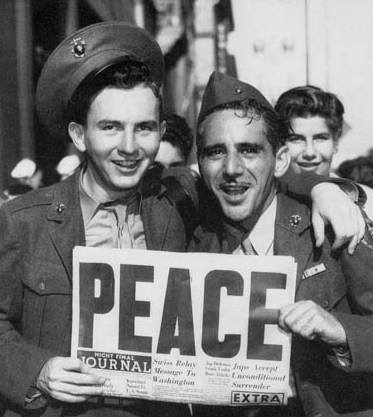1945
January
Battle of the Bulge. Allied troops came closer and closer to Germany, and Hitler decided to launch one last desperate offensive. His goal was to cut off Allied supplies coming through the port of Antwerp, Belgium. The attack began on December 16, 1944 and the Germans caught the Americans by surprise. The Americans got surrounded in the town Bastogne, but General Patton came three days later and attacked the German lines. The fighting continued until January 8, when the Germans began to withdraw. The Germans suffered more than 100 000 casualties and lost many tanks and aircrafts. Now there were very little to prevent the Allies from entering Germany.

February 19
Japan was to far away from the American base in the Mariana Islands. When the bombers arrived in Japan, they did not have enough fuel. The U.S. needed a base closer to Japan. American military planners decided on an island called Iwo Jima, so the United States Marines took Iwo Jima island by storm. Now the U.S. began a intense firebombing of Japan.
April 1
Despite the massive damage the firebombing caused, Japan gave no sign that they were ready to quit. American officials believed the Japanese would not surrender until Japan had been invaded. To be able to do this the U.S. needed a base closer to Japan, so the American forces landed on the Japanese island of Okinawa.

April 12
President Roosevelt died while vacationing in Warm Springs, Georgia. He suffered from a stroke. His vice-president, Harry S. Truman, became President.
April
Russian forces marching from the east and Allied troops from the west pushed closer and closer into Berlin. Hitler now knew that the end was near, and deep in his Berlin bunker on April 30, 1945 he committed suicide.
May 8
Before Hitler died he chose Grand Admiral Karl Doenitz to be his successor. Denitz tried to surrender to the Americans and the British while continuing to fight the Soviets, but Eisenhower insisted on unconditional surrender. This came on May 7, when Germany Surrendered unconditionally. The next day became V-E Day for "Victory in Europe".

June 26
Fifty nations signed the United Nations charter in San Francisco. President Roosevelt believed that a new international political organization could prevent another world war. The terms of the new organization, the United Nations, had been decided at the Dumbarton Oaks Estate in Washington DC.
August 6
The allies threatened Japan with "prompt and utter destruction" if the nation did not surrender, but the Japanese did not reply. Truman then ordered the military to drop the atomic bomb code named "Little-Boy" on Hiroshima. Nagasaki was bombed three days later.

August 9
The U.S.S.R. upheld their agreement from Theran and declared war on Japan. U.S.S.R. attacked Japanese in Manchuria.
August 15
Faced with the massive destruction and the shock from the Soviet joining the war the Japanese emperor ordered his government to surrender. This day is known as V-J Day.

August 19
End of U.S.S.R's Manchuria campaign officially ended on August 14 but some Japanese commanders chose to ignore or did not receive the cease-fire order. This became the final conflict of World War II.
September 2
Japan signed the surrender agreement on board USS Missouri.